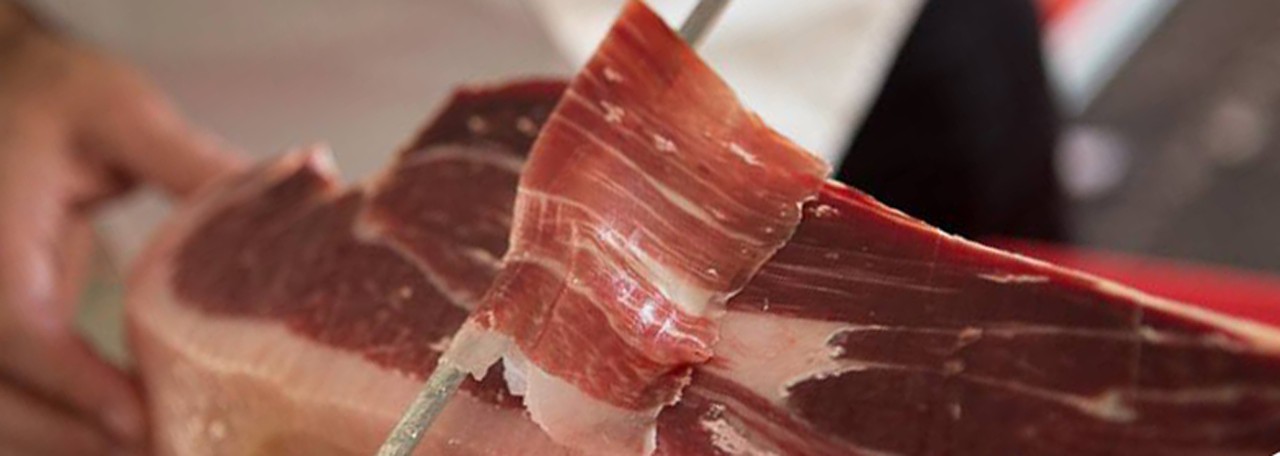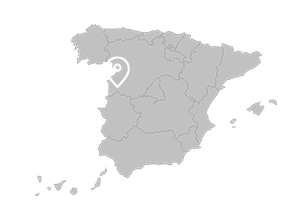.png.transform/rendition-xs/image_image%20(1).png)
Guijuelo PDO
Cured hams (hind extremities) and shoulders (fore extremities) from pure-bred Ibérico pigs, or cross-breeds with at least 75% Ibérico brought up under the extensive rearing system, with a minimum production period of 24 months for hams and 12 months for shoulders.
Tasting notes
Meat with a delicate and sweet taste, of little fibrous consistency and high friability. It has a pleasant and characteristic aroma. Unctuous fat, according to the acorns included in the animal’s feed. There’s bright aromatic white-yellowish coloration and pleasant, non-stale taste.
Other notes
Its external shape is wide, stylized, profiled and must keep the hoof. Depending on the category of the piece, weight will be no less than 14 lbs in the hams and three point 8 lbs or more in the shoulders of animals with a racial purity of 100%. Weight must be no less than 15,5lbs in hams and 8,8lbs in shoulders for animals of 75% racial purity.
Meat emphasizes the coloration of mycotic flora white, grayish, dark or violet. Consistency is firm in the muscular masses and slightly unctuous and depressible in the areas of adipose tissue. Color must be pink to reddish purple and shiny appearance with veins of adipose tissue and with fat infiltrated into muscle mass.
Production / Processing method
Hams and shoulders covered by this PDO shall come exclusively from the pure-bread Ibérico pigs or cross-breeds with at least 75% Ibérico blood crossed with the Duroc breed authorized in national legislation.
Slaughterhouses will be located in the processing area and will meet the technical and sanitary conditions required by current legislation. The animal shall remain, before slaughter, in the conditions of rest established in the regulations in force in relation to the slaughter of animals and animal welfare. Once the forelimbs and hindlimbs extremities have been obtained and properly identified by a security seal (black, red or green in order to its category), a cure is performed, consisting of five operations: salting, washing, post-salting, curing, ripening and aging.
Salting is the incorporation of salt to the muscular mass, favoring the dehydration of the extremities of the pig and its perfect conservation. The duration of this phase will depend on the weight of each piece. The purpose of the washing is to remove the adhered salt and is made with warm water. Then, the piece ismolded, profiled and thinned. The post-salting or settlement is the stage in which the diffusion of the salt into the ham or shoulder occurs. With the curing-ripening phase, the pieces gradually lose moisture, favoring their preservation. It is made in dryers duly registered in the PDO that have natural environmental conditions, with windows to the outside, and that the drying is done under natural conditions, where they remain the time necessary to achieve the natural fusion of the fat of its sweat protection "sweat ". At this stage the refining and profiling of the pieces is perfected. The duration of this process is six months minimum.
In the phase of aging the pieces pass to the cellar and to their definitive classification, with the placement of the official seals and vitolas according to their weight, race and handling. At the end of the production process, all numbered vitolas shall be imposed on all protected parts, which shall be correlated with the seals in which the type of product must be included, according to the sales denominations, the EU symbol and prominently the name and logo of the Protected Denomination of Origin Guijuelo. Once the above mentioned checks have been completed and the pieces are released, they are sold with the guarantee of their origin, materialized in the numbered seals and vitolas of the Protected Designation of Origin Guijuelo.
There are three different qualities, which are Black and Red for Bellota quality products, and Green for the field feedproduct. Guijuelo PDO is the first and only PDO that monitors, controls and guarantees sliced products from their Ibérico hams and shoulders, so the product keeps the PDO rating after being sliced. The slicing process is also carried out in the processing area to comply with the strictest sanitary requirements.
Geography / Relief and climate
The region of Guijuelo is located in the foothills of the Central System, between the Sierras de Béjar and France, in the heart of the cold Castillian Dehesa, with an average altitude of 1000 meters. The winters, prolonged for six months, facilitate the natural drying of the pieces. The mild summers give rise to the sweating, a phenomenon of vital importance as the fat infiltrates between the muscular portions causing the typical veining. Humidity, and environmental flora are also factors involved in the cure process of ham. This process lasts for approximately two years, treated exquisitely by the master ham, resulting in a characteristic product of the area.
The production area involved in the denomination covers several regions located within four Autonomous Communities, located in the southwestern part of the plateau (Meseta). The landscape of the whole area is very diverse and of great contrasts, due to the great extension of the corresponding area of production and to the diversity of regions of different Autonomous Communities. Crossed by the Central Mountain Range, Montes de Toledo and Sierra Morena contrasts with plains, hills and valleys with gentle slopes and small mountain ranges. The soils of the areas where most of the holm oaks are settled, have been formed on siliceous materials, mainly emphasizing granite rocks and large extensions of slates and sandstones. They are shallow and stony soils. Getting better yields with low rainfall, as rainfall floods the soil, spoiling crops. The climate is continental, of long and cold winters, with period of free frost; The summers are dry, hot and with strong thermal oscillations. As for the pluviometric regime, the rains are seasonally coincident with autumn and winter, this being the driest area in the province. These conditions of humidity and temperature are excellent for the production of quality hams.
Regulatory Council
Consejo Regulador de la DOP Guijuelo
Filiberto Villalobos, 4
Apartado de Correos 69
37770 Guijuelo (Salamanca)
Tel: (+34) 923 581 514
certificacion@jamondoguijuelo.com
comunicacion@jamondoguijuelo.com
www.jamondoguijuelo.com
Sources:
Consistency is firm in the muscular masses and slightly unctuous and depressible in the areas of adipose tissue.


- /content/dam/en/icex-foodswines/images/products/ibérico-ham---pork/guijuelo-pdo/Guijuelo%20PDO%20carr1.jpg
- /content/dam/en/icex-foodswines/images/products/ibérico-ham---pork/guijuelo-pdo/Guijuelo%20PDO%20carr2.jpg

Guijuelo (Castile-Leon)
